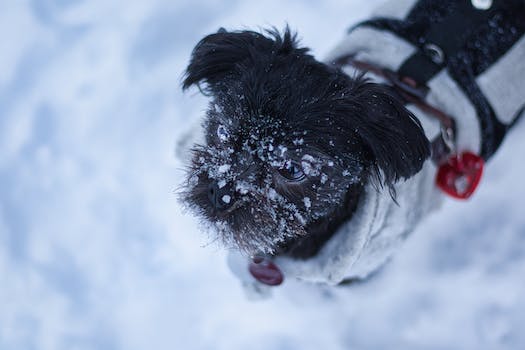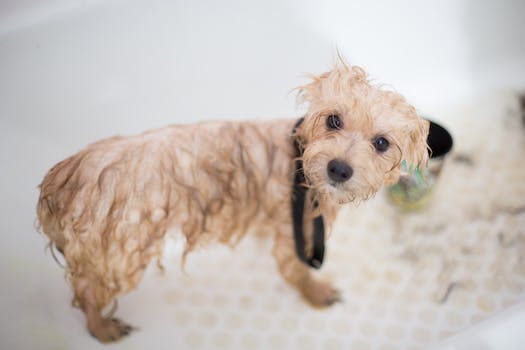“Fuel your Affenpinscher’s health and happiness with our comprehensive diet guide.”
The Affenpinscher is a small breed of dog known for its lively and energetic nature. To ensure their overall health and well-being, it is crucial to provide them with a balanced and nutritious diet. This diet guide will outline the essential aspects of an Affenpinscher’s diet, including recommended food types, portion sizes, and feeding schedule. By following these guidelines, you can help your Affenpinscher maintain a healthy weight and enjoy a long and happy life.
The Importance of a Balanced Diet for Affenpinschers
Affenpinschers are small, lively dogs known for their mischievous personalities and distinctive facial expressions. Despite their small size, they have big appetites and require a balanced diet to maintain their health and vitality. In this article, we will explore the importance of a balanced diet for Affenpinschers and provide a comprehensive guide to help you make informed decisions about your furry friend’s nutrition.
A balanced diet is crucial for Affenpinschers because it provides them with the necessary nutrients to support their growth, development, and overall well-being. Just like humans, dogs need a combination of proteins, carbohydrates, fats, vitamins, and minerals to thrive. Without a balanced diet, Affenpinschers may experience various health issues, including obesity, malnutrition, and digestive problems.
Proteins are the building blocks of life and play a vital role in the growth and repair of tissues. Affenpinschers require high-quality animal-based proteins, such as chicken, beef, or fish, to meet their protein needs. These proteins provide essential amino acids that cannot be synthesized by their bodies. Including lean meats in their diet ensures that they receive the necessary amino acids for optimal health.
Carbohydrates are an important source of energy for Affenpinschers. However, it is crucial to choose complex carbohydrates, such as whole grains and vegetables, over simple carbohydrates like refined grains and sugars. Complex carbohydrates provide a steady release of energy and help maintain stable blood sugar levels. On the other hand, simple carbohydrates can lead to energy spikes and crashes, which can negatively impact your Affenpinscher’s overall health.
Fats are another essential component of a balanced diet for Affenpinschers. They provide a concentrated source of energy and aid in the absorption of fat-soluble vitamins. However, it is important to choose healthy fats, such as those found in fish, nuts, and seeds, over unhealthy fats like saturated and trans fats. Healthy fats promote a shiny coat, support brain function, and contribute to a healthy immune system.
Vitamins and minerals are micronutrients that play a crucial role in various bodily functions. Affenpinschers require a wide range of vitamins and minerals, including vitamin A, vitamin D, vitamin E, calcium, phosphorus, and iron. These nutrients support bone health, immune function, and overall vitality. While a balanced diet should provide most of these micronutrients, it is advisable to consult with a veterinarian to determine if any additional supplements are necessary.
Transitioning to a balanced diet for your Affenpinscher should be done gradually to avoid digestive upset. Start by introducing small amounts of the new food while gradually reducing the old food over a period of 7-10 days. This allows your Affenpinscher’s digestive system to adjust to the new diet without causing any discomfort.
In conclusion, a balanced diet is of utmost importance for Affenpinschers to ensure their overall health and well-being. Providing them with high-quality proteins, complex carbohydrates, healthy fats, and essential vitamins and minerals is essential for their growth, development, and vitality. Remember to transition to a new diet gradually to avoid any digestive issues. By prioritizing your Affenpinscher’s nutrition, you can help them live a long, healthy, and happy life.
Understanding the Nutritional Needs of Affenpinschers
Understanding the Nutritional Needs of Affenpinschers
When it comes to taking care of our beloved Affenpinschers, one of the most important aspects to consider is their diet. Providing them with a balanced and nutritious diet is essential for their overall health and well-being. In this article, we will delve into the nutritional needs of Affenpinschers and provide you with a comprehensive guide to help you make informed decisions about their diet.
First and foremost, it is crucial to understand that Affenpinschers are small breed dogs with high energy levels. This means that they require a diet that is rich in nutrients to support their active lifestyle. A well-balanced diet for an Affenpinscher should consist of high-quality protein, healthy fats, and a moderate amount of carbohydrates.
Protein is the building block of muscles and is essential for the growth and repair of tissues. When choosing a dog food for your Affenpinscher, make sure that the primary ingredient is a high-quality source of protein, such as chicken, beef, or fish. Avoid foods that contain fillers or by-products, as these do not provide the necessary nutrients for your furry friend.
In addition to protein, healthy fats are also important for an Affenpinscher’s diet. Fats provide a concentrated source of energy and help to maintain healthy skin and coat. Look for dog foods that contain sources of omega-3 and omega-6 fatty acids, such as fish oil or flaxseed oil. These fatty acids have anti-inflammatory properties and can promote a shiny and healthy coat.
Carbohydrates, although not as essential as protein and fats, still play a role in an Affenpinscher’s diet. They provide a source of energy and can help to regulate blood sugar levels. However, it is important to choose complex carbohydrates, such as whole grains or sweet potatoes, over simple carbohydrates like white rice or corn syrup. Complex carbohydrates are digested more slowly, providing a steady release of energy throughout the day.
When determining the appropriate amount of food to feed your Affenpinscher, it is important to consider their age, weight, and activity level. Puppies and young dogs require more calories to support their growth and development, while older dogs may need fewer calories to maintain a healthy weight. It is always best to consult with your veterinarian to determine the specific dietary needs of your Affenpinscher.
In addition to providing a balanced diet, it is also important to ensure that your Affenpinscher has access to fresh water at all times. Hydration is crucial for their overall health and can help to prevent urinary tract infections and other health issues.
Lastly, it is worth mentioning that every dog is unique, and what works for one Affenpinscher may not work for another. It may take some trial and error to find the perfect diet for your furry friend. Pay attention to their energy levels, coat condition, and overall well-being to determine if the current diet is meeting their needs.
In conclusion, understanding the nutritional needs of Affenpinschers is essential for providing them with a healthy and balanced diet. Remember to choose high-quality protein sources, incorporate healthy fats, and opt for complex carbohydrates. Consult with your veterinarian to determine the appropriate amount of food for your Affenpinscher based on their age, weight, and activity level. And always keep fresh water available for them to stay hydrated. By following these guidelines, you can ensure that your Affenpinscher is getting the nutrients they need to thrive.
Best Food Choices for Affenpinschers: A Comprehensive Guide
Are you a proud owner of an Affenpinscher? If so, you know that this small and lively breed requires a well-balanced diet to thrive. Providing your Affenpinscher with the right food is essential for their overall health and happiness. In this comprehensive guide, we will explore the best food choices for Affenpinschers, ensuring that you can make informed decisions about your furry friend’s diet.
When it comes to choosing the best food for your Affenpinscher, it’s important to consider their unique nutritional needs. As a small breed, Affenpinschers have a fast metabolism and require a diet that is high in protein and fat. Look for dog food formulas specifically designed for small breeds, as these will often contain the right balance of nutrients to support your Affenpinscher’s energy levels and overall health.
One of the best food choices for Affenpinschers is a high-quality dry kibble. Dry kibble is convenient, easy to store, and provides a complete and balanced diet for your furry friend. Look for a kibble that lists a high-quality source of animal protein, such as chicken or beef, as the first ingredient. Avoid kibbles that contain fillers, artificial preservatives, and by-products, as these can be detrimental to your Affenpinscher’s health.
In addition to dry kibble, you may also consider incorporating wet food into your Affenpinscher’s diet. Wet food can be a tasty and nutritious addition to their meals, providing them with extra moisture and flavor. Look for wet food options that are made with real meat and vegetables, without any artificial additives or fillers. Mixing a small amount of wet food with your Affenpinscher’s dry kibble can create a delicious and satisfying meal for them.
Another important aspect of your Affenpinscher’s diet is treats. Treats are a great way to reward your furry friend for good behavior and provide them with additional nutrients. When choosing treats for your Affenpinscher, opt for ones that are small in size and made with high-quality ingredients. Avoid treats that are high in sugar, salt, or artificial flavors, as these can be harmful to your Affenpinscher’s health. Instead, look for treats that are made with natural ingredients, such as real meat or vegetables.
It’s also worth noting that Affenpinschers can be prone to dental issues, so it’s important to choose food and treats that promote good oral health. Look for kibbles and treats that are specifically designed to support dental hygiene, such as those with a crunchy texture or added dental benefits. Regular brushing of your Affenpinscher’s teeth is also recommended to keep their pearly whites in top shape.
In conclusion, providing your Affenpinscher with the best food choices is crucial for their overall well-being. Opt for high-quality dry kibble that is specifically formulated for small breeds, and consider incorporating wet food for added variety and moisture. Choose treats that are small, made with natural ingredients, and promote good dental health. By following these guidelines, you can ensure that your Affenpinscher receives a well-balanced and nutritious diet that will keep them happy and healthy for years to come.
Homemade vs. Commercial Diets for Affenpinschers: Pros and Cons

When it comes to feeding your Affenpinscher, you have two main options: homemade or commercial diets. Both have their pros and cons, and it’s important to consider your dog’s specific needs and preferences before making a decision.
Let’s start with homemade diets. Many dog owners prefer this option because it allows them to have full control over what goes into their pet’s food. You can choose high-quality ingredients, including fresh meats, vegetables, and grains, ensuring that your Affenpinscher gets all the nutrients they need. Plus, homemade diets can be tailored to your dog’s specific dietary requirements, such as allergies or sensitivities.
However, preparing homemade meals for your Affenpinscher can be time-consuming and requires careful planning. You need to ensure that the diet is balanced and provides all the necessary nutrients. This may involve consulting with a veterinary nutritionist to create a well-rounded meal plan. Additionally, homemade diets can be more expensive than commercial options, especially if you opt for organic or premium ingredients.
On the other hand, commercial diets offer convenience and a wide range of options. There are numerous brands and formulas available, catering to different life stages, health conditions, and dietary preferences. Commercial diets are formulated to meet the nutritional needs of dogs, and reputable brands undergo rigorous testing to ensure quality and safety.
Commercial diets also come in various formats, including dry kibble, wet canned food, and freeze-dried or dehydrated options. This allows you to choose the one that best suits your Affenpinscher’s preferences and needs. Additionally, commercial diets often contain added supplements and vitamins, which can be beneficial for your dog’s overall health.
However, not all commercial diets are created equal. Some lower-quality brands may contain fillers, by-products, and artificial additives that offer little nutritional value. It’s crucial to read the ingredient list and choose a brand that uses high-quality ingredients. Additionally, some dogs may have specific dietary requirements or sensitivities that are not adequately addressed by commercial diets. In such cases, a homemade or specialized diet may be necessary.
Ultimately, the decision between homemade and commercial diets for your Affenpinscher depends on various factors, including your dog’s health, preferences, and your own lifestyle. It’s essential to consult with your veterinarian to determine the best option for your furry friend.
If you choose to feed your Affenpinscher a homemade diet, make sure to do thorough research and consult with a veterinary nutritionist. They can help you create a balanced meal plan that meets your dog’s specific needs. Additionally, consider the time and effort required to prepare homemade meals regularly.
If you opt for a commercial diet, take the time to research different brands and read reviews. Look for high-quality ingredients and choose a formula that suits your Affenpinscher’s age, size, and health condition. Remember to transition your dog slowly to the new diet to avoid digestive upset.
In conclusion, both homemade and commercial diets have their advantages and disadvantages when it comes to feeding your Affenpinscher. It’s crucial to consider your dog’s individual needs and consult with your veterinarian to make an informed decision. Whether you choose homemade or commercial, providing a balanced and nutritious diet is key to keeping your Affenpinscher healthy and happy.
Feeding Guidelines for Affenpinscher Puppies: From Weaning to Adulthood
Feeding Guidelines for Affenpinscher Puppies: From Weaning to Adulthood
When it comes to raising a healthy and happy Affenpinscher puppy, one of the most important factors to consider is their diet. Providing the right nutrition during their early stages of life is crucial for their growth and development. In this article, we will guide you through the feeding guidelines for Affenpinscher puppies, from weaning to adulthood.
During the weaning stage, which typically starts around four to six weeks of age, it is important to introduce solid food gradually. Start by mixing a high-quality puppy food with warm water or puppy milk replacer to create a soft gruel. Allow the puppies to explore and taste the mixture, encouraging them to eat on their own. As they become more comfortable, you can gradually reduce the amount of liquid added until they are eating dry kibble.
As your Affenpinscher puppy grows, their nutritional needs will change. Around three to four months of age, you can transition them to a puppy-specific dry food. Look for a brand that is specifically formulated for small breeds, as Affenpinschers are considered a toy breed. These formulas are designed to provide the right balance of nutrients for their small size and high energy levels.
It is important to feed your Affenpinscher puppy multiple small meals throughout the day rather than one large meal. This helps prevent digestive issues and keeps their energy levels stable. Aim for three to four meals a day until they are around six months old, then gradually reduce it to two meals a day.
When choosing a puppy food, make sure it contains high-quality protein sources, such as chicken or lamb, as well as essential vitamins and minerals. Avoid foods that contain fillers or artificial additives, as these can be harmful to your puppy’s health. Always read the ingredient list and choose a brand that meets the nutritional standards set by reputable organizations.
As your Affenpinscher puppy reaches adulthood, their dietary needs will change once again. Around one year of age, you can transition them to an adult-specific dry food. Look for a formula that is specifically formulated for small breeds, as this will provide the right balance of nutrients for their size and activity level.
It is important to monitor your Affenpinscher’s weight and adjust their portion sizes accordingly. Obesity is a common issue in small breeds, so it is important to feed them the right amount of food to maintain a healthy weight. Consult with your veterinarian to determine the appropriate portion sizes for your dog based on their age, weight, and activity level.
In addition to a balanced diet, it is important to provide your Affenpinscher with plenty of fresh water at all times. Hydration is key to their overall health and well-being. Make sure to clean their water bowl regularly to prevent the growth of bacteria.
In conclusion, providing the right nutrition for your Affenpinscher puppy is essential for their growth and development. Start by gradually introducing solid food during the weaning stage and transition them to a high-quality puppy food formulated for small breeds. As they reach adulthood, switch to an adult-specific dry food and monitor their weight to prevent obesity. Remember to provide fresh water at all times and consult with your veterinarian for personalized feeding guidelines. By following these guidelines, you can ensure that your Affenpinscher has a healthy and balanced diet throughout their life.
Common Dietary Issues in Affenpinschers and How to Address Them
Affenpinschers are small, lively dogs known for their distinctive monkey-like appearance. Despite their small size, they have big personalities and are often described as fearless and confident. Like all dogs, Affenpinschers require a balanced and nutritious diet to maintain their health and well-being. However, they are prone to certain dietary issues that owners should be aware of and address accordingly.
One common dietary issue in Affenpinschers is food allergies. These dogs can develop allergies to certain ingredients in their food, such as beef, chicken, or grains. If your Affenpinscher is experiencing symptoms like itching, gastrointestinal upset, or skin irritations, it may be a sign of a food allergy. In such cases, it is important to consult with your veterinarian to determine the specific allergen and make necessary dietary changes.
Another dietary issue that Affenpinschers may face is obesity. These dogs have a tendency to gain weight easily, which can lead to various health problems. To prevent obesity, it is crucial to feed your Affenpinscher a portion-controlled diet and avoid overfeeding. Additionally, regular exercise is essential to keep them active and maintain a healthy weight. Remember, a chubby Affenpinscher may look cute, but it can have serious consequences for their overall health.
Dental health is another aspect of an Affenpinscher’s diet that should not be overlooked. These dogs are prone to dental issues, including tooth decay and gum disease. Feeding them a diet that promotes good oral health is crucial. Dry kibble or dental chews can help remove plaque and tartar buildup, reducing the risk of dental problems. Regular teeth brushing is also recommended to keep their teeth and gums healthy.
Furthermore, Affenpinschers are known for their sensitive stomachs. They can easily develop digestive issues, such as diarrhea or vomiting, if their diet is not suitable for their sensitive digestive system. It is important to choose a high-quality dog food that is easily digestible and free from common allergens. Avoid sudden changes in their diet, as it can upset their stomach. If your Affenpinscher experiences frequent digestive issues, consult with your veterinarian to determine the best diet for their specific needs.
In addition to addressing common dietary issues, it is important to provide your Affenpinscher with a well-rounded and balanced diet. This means ensuring they receive all the necessary nutrients, including proteins, carbohydrates, fats, vitamins, and minerals. High-quality commercial dog food that is specifically formulated for small breeds is a good option. However, it is always a good idea to consult with your veterinarian to determine the best diet plan for your Affenpinscher based on their age, activity level, and overall health.
In conclusion, Affenpinschers are adorable and lively dogs that require a carefully planned diet to maintain their health and well-being. Common dietary issues in Affenpinschers include food allergies, obesity, dental problems, and sensitive stomachs. By addressing these issues and providing a balanced diet, you can ensure that your Affenpinscher remains healthy and happy for years to come. Remember, consulting with your veterinarian is always a good idea when it comes to your dog’s dietary needs.
Special Dietary Considerations for Senior Affenpinschers
As your Affenpinscher gets older, their dietary needs may change. Just like humans, senior dogs require a different balance of nutrients to support their aging bodies. In this section, we will discuss some special dietary considerations for senior Affenpinschers.
One important consideration for senior Affenpinschers is their decreased activity level. As dogs age, they tend to become less active and may not burn as many calories as they used to. This means that they may need fewer calories in their diet to prevent weight gain. It’s important to monitor your senior Affenpinscher’s weight and adjust their food intake accordingly. If you notice that your dog is gaining weight, you may need to reduce their portion sizes or switch to a lower-calorie dog food.
Another consideration for senior Affenpinschers is their changing metabolism. As dogs age, their metabolism slows down, which can make it harder for them to digest certain foods. Some senior dogs may develop digestive issues such as constipation or diarrhea. To help support your senior Affenpinscher’s digestion, you may want to consider feeding them a diet that is easily digestible. Look for dog foods that contain high-quality proteins and easily digestible carbohydrates.
Senior Affenpinschers may also benefit from a diet that is rich in antioxidants. Antioxidants help to neutralize harmful free radicals in the body, which can contribute to aging and disease. Foods that are high in antioxidants include fruits and vegetables such as blueberries, spinach, and sweet potatoes. You can add these foods to your senior Affenpinscher’s diet as treats or mix them into their regular dog food.
In addition to antioxidants, senior Affenpinschers may also benefit from supplements such as glucosamine and chondroitin. These supplements can help to support joint health and mobility, which can be especially important for older dogs. Talk to your veterinarian about whether these supplements would be beneficial for your senior Affenpinscher and what the appropriate dosage would be.
It’s also important to consider your senior Affenpinscher’s dental health when planning their diet. As dogs age, they may be more prone to dental issues such as gum disease or tooth decay. Feeding your senior Affenpinscher a diet that includes dental-friendly foods can help to promote good oral health. Look for dog foods that are specifically formulated to support dental health, or consider adding dental chews or treats to your dog’s routine.
Lastly, it’s important to remember that every dog is unique, and what works for one senior Affenpinscher may not work for another. It’s always a good idea to consult with your veterinarian before making any major changes to your dog’s diet. They can provide personalized recommendations based on your senior Affenpinscher’s specific needs and health conditions.
In conclusion, senior Affenpinschers have special dietary considerations that should be taken into account. Adjusting their calorie intake, choosing easily digestible foods, incorporating antioxidants and supplements, promoting dental health, and consulting with a veterinarian are all important steps in providing a balanced and nutritious diet for your aging Affenpinscher. By paying attention to their changing needs, you can help ensure that your senior Affenpinscher remains healthy and happy in their golden years.
Tips for Maintaining a Healthy Weight in Affenpinschers
Maintaining a healthy weight in Affenpinschers is crucial for their overall well-being. These small, lively dogs are prone to weight gain, which can lead to a variety of health issues. In this article, we will provide you with some tips on how to keep your Affenpinscher at a healthy weight.
First and foremost, it is important to understand the dietary needs of your Affenpinscher. These dogs require a balanced diet that is rich in nutrients. A high-quality dog food that is specifically formulated for small breeds is a good choice. Look for a brand that lists meat as the first ingredient and avoids fillers such as corn or wheat.
Portion control is key when it comes to maintaining a healthy weight in Affenpinschers. These dogs have a tendency to overeat, so it is important to measure their food carefully. The packaging of your dog food should provide guidelines on how much to feed based on your dog’s weight and activity level. It is always a good idea to consult with your veterinarian to determine the appropriate portion size for your Affenpinscher.
In addition to portion control, it is important to establish a feeding schedule for your Affenpinscher. Feeding your dog at the same time every day helps to regulate their metabolism and prevents them from grazing throughout the day. Stick to the recommended number of meals per day based on your dog’s age and activity level. Avoid leaving food out all day as this can lead to overeating.
Treats can be a source of extra calories for your Affenpinscher, so it is important to choose them wisely. Opt for low-calorie treats or use small pieces of fruits and vegetables as rewards. Avoid giving your dog table scraps as these can be high in fat and unhealthy for them. Remember, treats should only make up a small portion of your dog’s daily caloric intake.
Exercise is another important factor in maintaining a healthy weight in Affenpinschers. These dogs are energetic and require regular physical activity to burn off excess calories. Aim for at least 30 minutes of exercise per day, which can include walks, playtime, or interactive toys. Engaging in activities that stimulate their mind and body is also beneficial for their overall well-being.
Regular visits to the veterinarian are essential for monitoring your Affenpinscher’s weight and overall health. Your vet can provide guidance on maintaining a healthy weight and recommend any necessary dietary adjustments. They can also check for any underlying health conditions that may contribute to weight gain.
In conclusion, maintaining a healthy weight in Affenpinschers is crucial for their overall well-being. By providing a balanced diet, controlling portions, establishing a feeding schedule, choosing low-calorie treats, and ensuring regular exercise, you can help your Affenpinscher stay fit and healthy. Remember to consult with your veterinarian for personalized advice and guidance. With proper care and attention, your Affenpinscher can live a long, happy, and healthy life.
Q&A
1. What is the recommended diet for an Affenpinscher?
The recommended diet for an Affenpinscher typically consists of high-quality dry dog food formulated for small breeds.
2. How often should an Affenpinscher be fed?
An Affenpinscher should be fed two to three small meals per day to prevent overeating and maintain a healthy weight.
3. Can an Affenpinscher be fed a homemade diet?
Yes, an Affenpinscher can be fed a homemade diet, but it is important to consult with a veterinarian or canine nutritionist to ensure it meets their nutritional needs.
4. Are there any specific dietary requirements for an Affenpinscher?
Affenpinschers may have specific dietary requirements based on their age, activity level, and any underlying health conditions. Consult with a veterinarian for personalized recommendations.
5. Should an Affenpinscher be given any supplements?
Supplements are not typically necessary for an Affenpinscher if they are being fed a balanced and nutritious diet. However, specific supplements may be recommended by a veterinarian for certain health conditions.
6. Can an Affenpinscher be given human food as treats?
Some human foods can be given as treats in moderation, but it is important to avoid foods that are toxic to dogs, such as chocolate, onions, and grapes. Always check with a veterinarian before introducing new foods.
7. How much water should an Affenpinscher drink?
An Affenpinscher should have access to fresh water at all times. The amount of water they drink can vary depending on their size, activity level, and the weather.
8. Are there any foods that an Affenpinscher should avoid?
Affenpinschers should avoid foods that are toxic to dogs, such as chocolate, onions, grapes, raisins, garlic, and certain artificial sweeteners like xylitol. Additionally, fatty or spicy foods can cause digestive upset and should be avoided.In conclusion, a proper diet guide for Affenpinschers should include high-quality dog food that is specifically formulated for small breeds. It should consist of a balanced mix of protein, carbohydrates, and fats, with a focus on lean meats, whole grains, and healthy fats. Portion control is important to prevent obesity, and regular exercise should be incorporated into their daily routine. It is also recommended to consult with a veterinarian for personalized dietary recommendations for an Affenpinscher.



